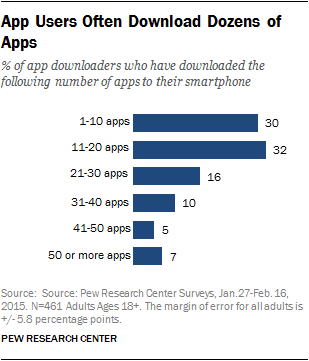Choosing a mobile app can be like going on an amazingly bad first date.
At the outset you’re not sure you’re compatible, but you can’t help digging the look. Then you meet up. Within seconds, you realize it’s a Venus-Mars kind of thing. You’re bored, wonder about ongoing performance issues, and often end up stuck with the bill without nothing to show for it. Then that darn app keeps showing up everywhere you look to remind you of just how badly the courtship went.
It’s not you, it’s them, right? Everybody knows a good app is simply too hard to find.
And yet, we keep at it. Some 38 percent of smartphone owners have downloaded 21 or more apps to a smartphone, a November 2015 Pew Research study found. Most sit idle, taunting your serial dating habits. Just 16% of us use more than 10 apps on our phones on a regular basis. By day 30, only 3.3% of Android users and 3.2% on iOS are still smitten enough to dig deeper into an app they download.

App Deep Linking
App deep links are Google and Apple’s attempt to clear up the lines of communication. Search engines are perfecting the ability to deliver results from specific pages within apps, making it easier to find just what you’re looking for – much like you’d do during desktop searches (and no swipe right or left necessary). In other words, it saves users’ time by foregoing loading the app and directly providing information or specific page the user is likely seeking. It’s a great method of boosting retention since you’re now providing utility to the customer.
Google last year upped the ante for both developers and mobile device owners, letting some searchers give particular apps a test run before installing them on a mobile device. The streamed apps run from Google’s servers instead of a device, offering a path to customer acquisition that wasn’t available before.
While currently available only in the U.S. and only on newer Android devices, it’s clear Google sees this as the future of app indexing. If an app doesn’t have a website or is more useful than the website on mobile, Google wants each one to have a deep-linked streaming option.
In its early testing, users see a note that proclaiming it’s an “App streamed by Google (beta).” If you click on that banner at the bottom, there’s an option to install the app, learn more about app streaming, go back to the Google search results or close out the window.
For Google, such a future can deliver important user behavioral cues and foster greater use of Android, thereby boosting ad sales. Google also can store and use that personal information to better know you across a range of devices. For example, if you stream an app that offers local restaurant choices, Google would remember your preference if you chose Chinese as a food favorite and pull up those results first, whether you’re checking from a home pc or browsing on a phone or tablet in New York. .
With iOS 9, developers can now inform Apple of deep links in applications. These deep links will then be shown in a Safari or Spotlight search. Spotlight searches various channels simultaneously, including the address book, calendar and also app deep links, and displays the results together. The user does not need to have the app installed.
What’s In It For Me?
By implementing app links in Google and iOS search results, online businesses can gain more users through organic traffic channels. App indexing also functions as a retention channel for users that have already installed the app. The combined result is more app interactions, more traffic and more conversions.
Does that mean you should rush to get your team started on deep-linking and streaming?
For some industries, I think deep linking is a no-brainer; others might not find it as useful. Developers have to map the app and register the routes a user could take from the starting page to any given point in the app. It requires a bit of finesse to anticipate those potential routes, particularly if you’re a large retailer, but isn’t so daunting you shouldn’t do it.
Our recent Searchmetrics App Indexing Study found that while eight in 10 websites offer an app, only 30 percent of Android apps and 19 percent of iOS have implemented deep linking. Apparel and publishing sites have already jumped aboard the deep-linking train. On Android, tourism, health and finance are following.
Virtually every industry is implementing deep-linking on Apple’s iOS, with the exception of tourism. Electronics and tourism the two laggards, tend to be more seasonal and therefore have fewer purchase decisions driving deep-linking. Someone searching among those industries also might be more liable to do so on larger screens, in non-mobile settings.
Conclusion
We’ll be breaking this down more granularly in coming App Ranking studies. Those considering app indexing in mobile organic search should go into it thinking it can help you market your app, gain more app installations and increase customer loyalty, as well as drive more traffic and conversions.


